In the rapidly evolving landscape of sustainable development, the concept of a circular economy has emerged as a transformative approach to addressing India’s mounting waste transformation challenges. As urban centers like Mumbai, Delhi, and Bangalore grapple with escalating waste volumes, forward-thinking businesses are leveraging Corporate Social Responsibility (CSR) initiatives to reimagine waste not as a burden, but as a valuable resource. By embracing innovative strategies that prioritize recycling, upcycling, and community engagement, these organizations are pioneering a new paradigm where waste becomes a catalyst for environmental conservation, social empowerment, and economic opportunity.
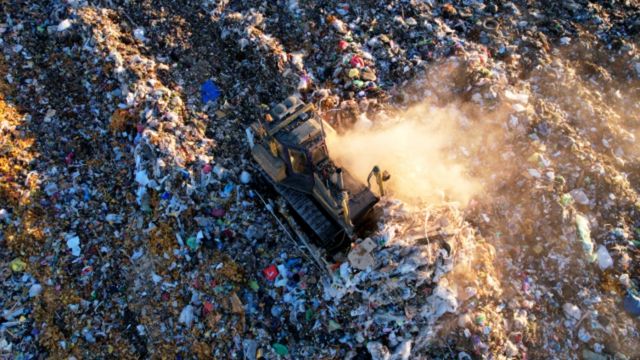
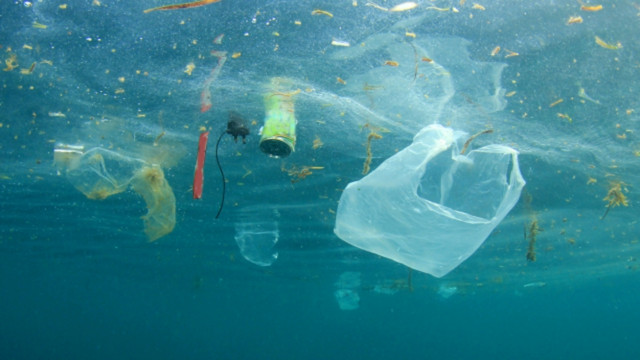
The Need for CSR in Waste transformation
India generates approximately 62 million tons of waste annually, of which only 20% is recycled, leaving the remaining to pollute the environment or languish in landfills. Traditional waste transformation approaches—focused on collection and dumping—are no longer viable to handle the scale of waste and its environmental consequences. Businesses mandated by Section 135 of the Companies Act, 2013, to spend 2% of their profits on CSR, are now channeling these funds into impactful waste transformation initiatives.
CSR-driven waste transformation projects not only fulfill compliance requirements but also align with global Environmental, Social, and Governance (ESG) goals, making businesses more attractive to stakeholders. Initiatives such as those by Earth5R demonstrate how CSR investments can yield measurable environmental and social benefits, while contributing to a circular economy.
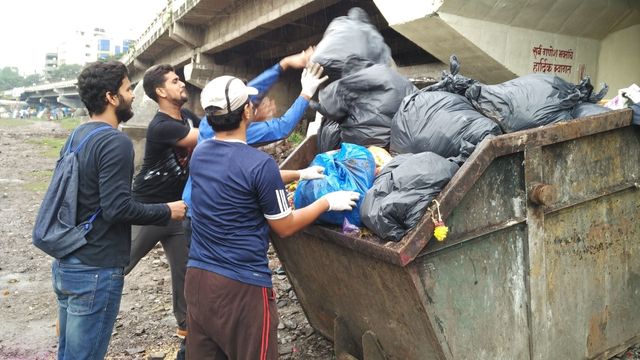
Innovative CSR Practices in Waste transformation
Forward-thinking CSR projects are redefining waste management in India, focusing on decentralization, technology integration, and community involvement to achieve lasting impact.
1. Decentralized Waste Management
Instead of relying solely on centralized systems, companies are investing in localized waste processing facilities. Decentralized waste management involves setting up small-scale composting units and recycling hubs within communities, reducing the need for long-distance waste transportation and lowering associated carbon emissions. Studies show that decentralized systems can increase efficiency and community participation.
For example, housing societies in Pune and Bangalore have implemented CSR-funded composting units and material recovery facilities (MRFs) to handle organic and recyclable waste locally. These facilities not only reduce the strain on overburdened municipal systems but also create opportunities for community members to engage in waste segregation and processing activities.
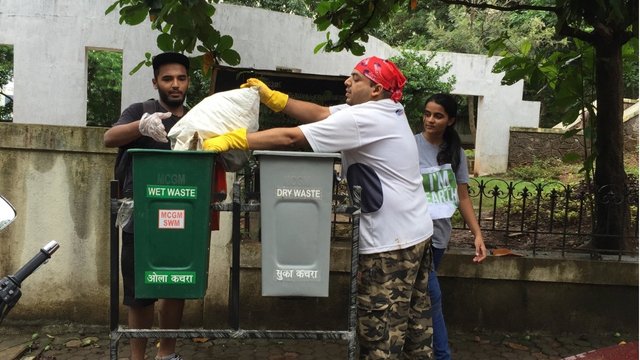
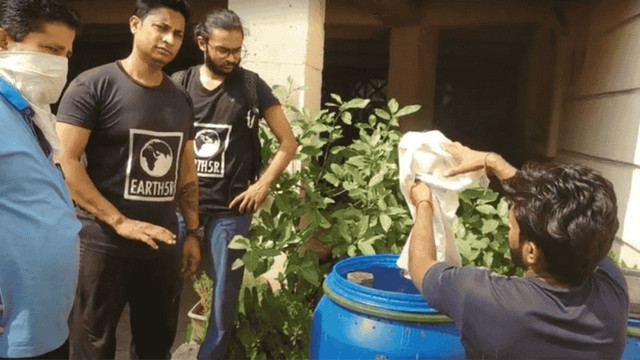
2. Source Segregation Awareness
Waste segregation at the source is a critical component of successful waste transformation, yet it remains one of the most challenging practices to implement effectively. CSR initiatives in cities like Mumbai and Delhi focus on educating citizens about the environmental and economic benefits of separating organic, recyclable, and hazardous waste streams.
Organizations such as Earth5R conduct awareness campaigns and training sessions, equipping residents with the knowledge and tools required to segregate waste correctly. Research highlights that proper source segregation can improve recycling efficiency by up to 50% and significantly reduce landfill dependency. These initiatives also involve local schools, community leaders, and NGOs to ensure widespread adoption and long-term impact.
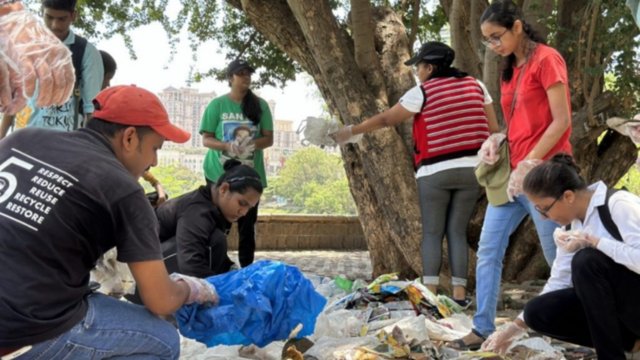
3. Promoting Circular Economy Models
The circular economy—which prioritizes reuse, recycling, and the repurposing of waste materials—is becoming an integral part of CSR waste management projects. By focusing on transforming waste into valuable resources, these initiatives align with global sustainability goals and reduce the environmental footprint of waste disposal.
Programs like Earth5R’s Plaempower communities to upcycle plastic waste into functional or decorative products, such as furniture and household items. These efforts not only divert waste from landfills but also provide income-generating opportunities for marginalized groups. According to a report by the Ellen MacArthur Foundation, adopting circular economy practices globally could yield economic benefits of up to $4.5 trillion by 2030.
4. Leveraging Technology for Transparency and Efficiency
Technology is playing an increasingly crucial role in modern CSR waste transformation projects by enhancing transparency, improving operational efficiency, and ensuring measurable impact. Companies partnering with Earth5R utilize the Earth5R App to monitor on-ground activities, collect geotagged data, and generate detailed progress reports.
- Real-Time Monitoring: Geotagged data enables companies to track waste collection, segregation, and recycling metrics in real time, ensuring accountability at every stage of the project.
- Automated Reporting: The app generates ESG-compliant reports, detailing environmental, social, and economic impacts, helping businesses meet global sustainability standards and regulatory requirements.
- Cost Optimization: By identifying inefficiencies through data analytics, companies can optimize resource allocation and maximize the ROI of their CSR initiatives.
The integration of blockchain technology in waste management is another emerging trend, providing immutable records of waste transactions and enhancing trust among stakeholders. For instance, blockchain-based solutions can validate the recycling of plastic waste, ensuring compliance with producer responsibility mandate.
Earth5R’s Leadership in CSR-Driven Waste transformation
As one of India’s largest environmental NGOs, Earth5R collaborates with corporates to design and implement CSR initiatives that address critical waste management challenges while creating measurable social and environmental impact. Here’s how Earth5R’s approach stands out:
1. Comprehensive Plastic Recovery Programs
Plastic waste is a significant environmental issue in India, and Earth5R has developed innovative solutions to tackle this problem.
- Scale and Impact: In cities like Mumbai and Delhi, Earth5R’s plastic recovery programs have collected over 2,500 tons of plastic, preventing 4,200 metric tons of CO2 emissions annually.
- Community Involvement: By engaging local communities and informal waste-pickers, the program creates stable income opportunities for marginalized groups.
- Tech Integration: The use of Earth5R’s app ensures transparency and efficiency by logging every kilogram of waste collected and recycled.

2. Livelihood Creation Through Waste Upcycling
Earth5R’s CSR initiatives focus on integrating waste management with livelihood generation. In Mumbai’s Dharavi slums, women have been trained to upcycle waste into marketable products such as bags, furniture, and decor items.
- Economic Empowerment: Over 500 women have been trained, producing more than 20,000 upcycled products annually.
- Circular Economy Impact: These initiatives reduce waste while fostering economic independence for underprivileged communities.


3. Waste-to-Wealth CSR Projects
Earth5R partners with businesses to transform waste into valuable resources, creating a win-win situation for both companies and communities. For example, a beverage company’s CSR project with Earth5R resulted in the recovery of 1,000 tons of packaging waste, which was recycled into new products.
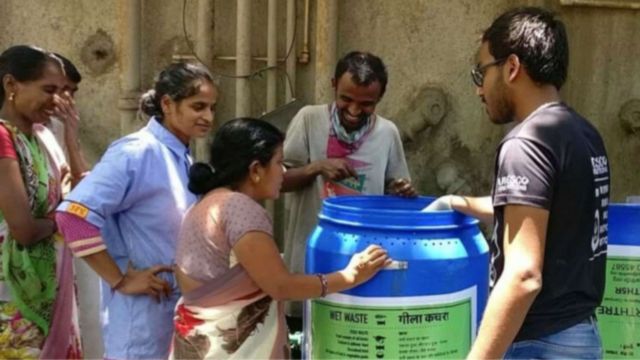
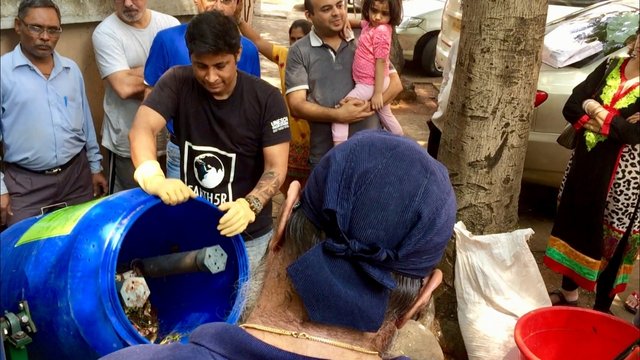
Technology as a Catalyst in CSR Waste transformation
Technology is a game-changer in CSR waste management projects, enabling data-driven decisions and ensuring transparency. Earth5R’s app and dashboard provide a seamless platform for companies to:
- Monitor Progress in Real-Time:
- Geotagged data collection allows companies to track waste collection, segregation, and recycling metrics.
- Real-time dashboards provide insights into the environmental and social impact of CSR investments.
- Optimize Resource Allocation:
- Advanced analytics help identify inefficiencies and ensure that resources are allocated effectively.
- This reduces project costs while maximizing ROI.
- Generate ESG-Compliant Reports:
- Automated impact reports help companies meet their ESG and CSR reporting requirements with accuracy and transparency.
Global Trends in CSR Waste transformation
India’s waste management landscape is evolving in line with global trends, where CSR and ESG initiatives play a crucial role in driving sustainability. Countries like Sweden and Japan have achieved recycling rates of over 90% by adopting circular economy principles and integrating advanced technologies. India, with its unique challenges, is increasingly adapting these global practices through initiatives driven by organizations like Earth5R.
Let’s look at few global examples of effective CSR projects in waste management outside India:
1. Nestlé’s Plastic Waste Initiative in the Philippines
Nestlé has been actively involved in addressing plastic pollution through its “Plastic Waste Management Program” in the Philippines. Partnering with local organizations and communities, the initiative focuses on collecting, sorting, and recycling plastic waste while promoting community education about sustainable waste management.
- Impact: Over 45,000 metric tons of plastic waste have been recovered annually since the program’s inception.
- CSR and Circular Economy: Nestlé ensures that the collected plastic is recycled into useful products, aligning with its global commitment to achieving 100% recyclable or reusable packaging by 2025.
2. Unilever’s Zero Waste to Landfill Program
Unilever implemented a groundbreaking global policy to achieve “Zero Waste to Landfill” status across all its manufacturing sites. In partnership with waste management companies, the program focuses on recycling and reusing waste instead of sending it to landfills.
- Impact: Over 600 sites worldwide planned to achieve zero waste to landfill .
- CSR Focus: This initiative is a testament to Unilever’s commitment to integrating sustainable practices into its core business model.
3. Coca-Cola’s World Without Waste Program
Coca-Cola launched its ambitious “World Without Waste” initiative, aiming to collect and recycle every bottle or can it sells by 2030. The program includes investments in recycling infrastructure, consumer education campaigns, and partnerships with NGOs.
- Impact: Coca-Cola has funded the development of over 150 recycling plants globally and has achieved a 60% collection rate for bottles in key markets like Latin America.
- CSR Strategy: The initiative demonstrates Coca-Cola’s ESG alignment, focusing on reducing its plastic footprint and promoting a circular economy.
4. IKEA’s Circular Economy Pilot in the UK
IKEA launched a pilot program in the United Kingdom to promote circularity by taking back old furniture from customers for recycling or refurbishment. The initiative encourages waste reduction through repair and reuse, fostering sustainable consumer behavior.
- Impact: The pilot has successfully diverted thousands of tons of furniture waste from landfills while generating additional revenue through refurbished product sales.
- CSR Alignment: This program is part of IKEA’s larger goal to become a fully circular and climate-positive business by 2030.
5. Danone’s Plastic Waste Partnership in Indonesia
Danone collaborated with local waste-pickers and NGOs in Indonesia to create a sustainable waste management system. The program focuses on establishing plastic waste collection centers, providing livelihood opportunities for waste-pickers, and ensuring proper recycling.
- Impact: The initiative has helped recycle over 12,000 tons of plastic annually while improving the income of more than 5,000 waste-pickers.
- CSR Focus: By integrating local communities into the waste management process, Danone combines social empowerment with environmental sustainability.
Understanding the Challenges: Why Some Waste Management Projects Fail
While successful CSR initiatives demonstrate the potential of innovative and sustainable waste management, not all projects achieve their intended outcomes. Several high-profile waste management projects have failed due to factors such as poor planning, lack of stakeholder alignment, underestimation of costs, and inadequate infrastructure. These failures serve as valuable lessons, emphasizing the need for comprehensive planning, technology integration, and community engagement to ensure project sustainability and impact.
Examples of High-Profile Failed Waste Management Projects
Boeing’s Algae Biofuel Plant in the US
Boeing’s ambitious algae biofuel project aimed to produce sustainable jet fuel by leveraging algae, which could reduce greenhouse gas emissions significantly compared to conventional fuels. Despite initial success and widespread attention, the project faced numerous setbacks. These included challenges in scaling production, high costs of maintaining algae cultivation facilities, and logistical difficulties in integrating biofuels into the supply chain.
- Reasons for Failure:
- Inadequate cost-efficiency compared to fossil fuels.
- Lack of infrastructure for mass production and distribution.
- Impact: The project was discontinued, highlighting the challenges of scaling emerging technologies without substantial government or industry support.
- Lessons Learned: Companies need robust cost analysis, technological readiness, and supportive policies to ensure project scalability.
Mumbai’s Deonar Landfill Waste-to-Energy Project (India)
The Deonar landfill, one of the oldest and largest in Mumbai, became infamous for its pollution and frequent fires, which caused severe air quality issues. A waste-to-energy project was proposed to process the landfill’s waste and generate electricity. The project attracted significant public and government interest but ultimately failed due to poor execution.
- Reasons for Failure:
- Lack of adequate waste segregation at source.
- High contamination levels in the landfill waste.
- Financial and logistical mismanagement.
- Impact: The project was abandoned, leaving the landfill as a major environmental hazard.
- Lessons Learned: Effective waste-to-energy projects require comprehensive segregation systems and long-term funding plans to succeed.
Recycling Crisis Following China’s National Sword Policy (Global)
Many developed countries, including the US and European nations, heavily relied on China to process their recyclable waste. When China implemented its National Sword Policy in 2018, banning the import of contaminated recyclable materials, the global recycling system collapsed, leading to stockpiles of waste and the closure of recycling facilities.
- Reasons for Failure:
- Over-reliance on a single country for waste processing.
- Inadequate domestic recycling infrastructure in exporting nations.
- High contamination levels in exported recyclables.
- Impact: Recycling rates plummeted globally, and massive amounts of waste were diverted to landfills or incineration plants. Governments were forced to rethink waste transformation strategies.
- Lessons Learned: A resilient waste transformation system requires local recycling capabilities, stringent quality standards, and diversified processing options.
UN SDGs and CSR Alignment
CSR projects aligned with the United Nations Sustainable Development Goals (SDGs) (UN SDGs) ensure that businesses contribute to global objectives such as sustainable cities, responsible consumption, and climate action. Earth5R’s programs directly support these goals by addressing waste transformation, community development, and environmental conservation.
Long-Term Benefits of CSR in Waste Management
Investing in CSR waste management projects offers numerous long-term benefits for businesses, communities, and the environment:
1. Enhanced Brand Reputation
A company’s reputation is one of its most valuable assets, and businesses that actively engage in impactful and transparent CSR projects establish themselves as socially responsible leaders. For instance, companies working with Earth5R gain recognition for their commitment to sustainability by implementing projects that produce measurable environmental and social outcomes. Consumers today increasingly prioritize brands that demonstrate tangible contributions to environmental conservation, as evidenced by studies like the Edelman Trust Barometer
Through their association with innovative waste transformation projects, businesses enhance their brand visibility, attract eco-conscious customers, and build stronger relationships with stakeholders, including investors and regulatory bodies.
2. Higher ROI on CSR Investments
One of the primary goals of any CSR initiative is to achieve the maximum impact with the resources invested. Earth5R’s data-driven approach ensures that companies achieve better returns on their CSR spending by streamlining waste management projects to eliminate inefficiencies.
By leveraging technology, such as real-time monitoring through Earth5R’s app, companies can track the success of initiatives and adjust strategies as needed. This optimization not only reduces costs but also amplifies the positive outcomes of the projects, delivering superior ROI while aligning with global sustainability standards. Studies such as the Harvard Business Review’s analysis on sustainable practices reveal that companies focusing on sustainability often outperform financially in the long term.
3. Sustainable Social and Environmental Impact
CSR projects that integrate waste transformation with community development create ripple effects that benefit both people and the planet for generations. Earth5R’s livelihood programs, for example, empower underprivileged groups such as women in slums to turn waste into valuable products, creating income opportunities while reducing landfill waste.
Moreover, these projects directly address environmental issues like pollution, resource depletion, and greenhouse gas emissions. By fostering long-term community engagement and implementing scalable solutions, businesses ensure that the social and environmental impact of their CSR initiatives extends far beyond the project’s duration.
4. Competitive Advantage
In today’s globalized economy, businesses are increasingly evaluated on their environmental, social, and governance (ESG) performance. Companies that proactively align their CSR projects with ESG goals gain a competitive edge by demonstrating a forward-thinking approach to sustainability.
Global investors and financial institutions, guided by frameworks like the Task Force on Climate-related Financial Disclosures (TCFD), prioritize businesses with strong sustainability credentials. CSR waste management projects, such as those implemented by Earth5R, position companies as attractive investment opportunities, particularly in markets where environmental stewardship is a key differentiator.
Setting New Benchmarks
CSR-driven waste management projects are transforming how India addresses its waste crisis, offering scalable and sustainable solutions that benefit businesses, communities, and the environment. Organizations like Earth5R, with their expertise in designing and implementing innovative CSR initiatives, are setting benchmarks for impactful and efficient waste management practices.
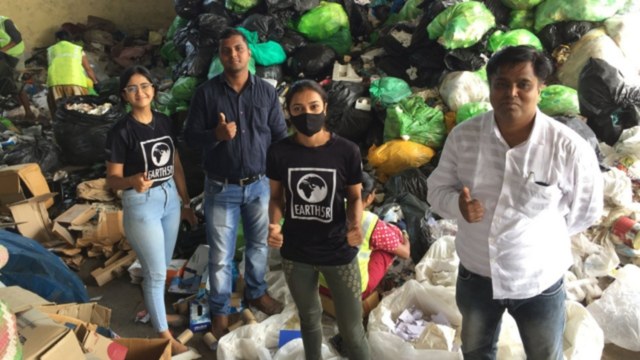
By leveraging technology, promoting circular economy models, and focusing on community empowerment, Earth5R ensures that every CSR project delivers measurable outcomes and aligns with global sustainability goals. As businesses increasingly recognize the value of CSR in waste management, the opportunities to create a cleaner, greener, and more sustainable India are limitless. Together, companies, communities, and environmental leaders can turn waste into wealth, transforming challenges into opportunities for a better future.


